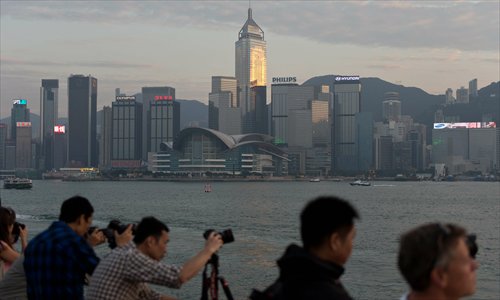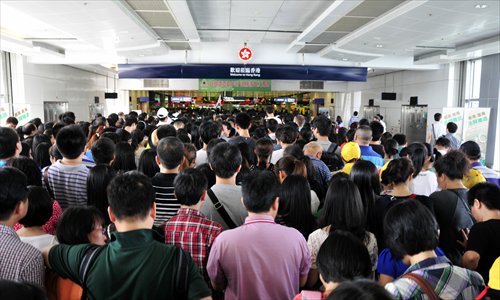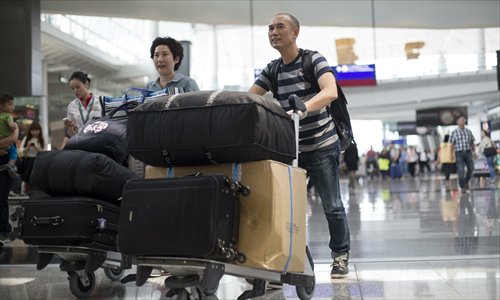Influx of mainland visitors adds fuel to Hong Kong’s political warfare

Hong Kong skyline. Photo: CFP
Mainland visitors get a schizophrenic message from Hong Kong. On one side of the streets, a political group waving national flags and blasting music to welcome them; while across the street another group yells insults and tells them to go home.
Global Times saw one such scene in a crowded shopping district in Causeway Bay. Dozens of members from two opposing political groups, the pro-mainland Voice of Loving Hong Kong and the anti-mainland People Power, yelled at each other. But it's one that's been repeated over and over again in Hong Kong in recent months.
The concern behind this confusing message is the rising number of mainland tourists in Hong Kong Special Administrative Region (SAR). The city hosted some 35 million tourists from the mainland in 2012, almost six times its entire population.
The increasing number of mainland tourists has contributed to the city's economic growth. But it has led to a series of social problems such as a shortage of baby formula, mothers flocking to Hong Kong to give birth and claiming residence for their babies, and unpleasant behavior on both sides, from mainlanders eating in the subway to Hongkongers flinging racist insults at visitors.
Some Hongkongers refer to mainland visitors as "locusts," seeing them as a swarm of ravenous insects that will devour the orderly society the islands have built.

People wait to cross the border to Hong Kong in Shenzhen, Guangdong Province on July 7, 2012. Photo: CFP
Attitude shift
Seventeen years after Hong Kong was returned to China, the gap between citizens of the former British colony and those from the mainland seems to be widening.
On February 16, some 100 Hongkongers from the People Power group marched through Tsim Sha Tsui district of Kowloon, a luxury shopping area favored by many mainland tourists, calling for mainlanders to "go back to China" and demanding that the Hong Kong government take measures to stop them from visiting.
Local government officials condemned the action. "We have zero tolerance if such events happen again," Chief Secretary Carrie Lam Cheng Yuet-ngor said in a press conference. "I believe such behavior belongs to only a few extremists and surely doesn't represent the majority's opinions and values." Still, many mainland tourists said their feelings were hurt.
The People Power group refused an interview request.
"Hongkongers' attitudes toward mainlanders have changed in recent years," a Hong Kong reporter surnamed Hong told the Global Times. "They used to see mainlanders like brothers, now they see them as neighbors."
"Their attitudes now is 'mind your own business, don't bother me,'" she added. Many Hongkongers see mainlanders as a burden. Mainland travelers almost emptied Hong Kong's milk powder stock after a milk formula scandal in 2008 that caused infant deaths across the country. The SAR government eventually issued a rule that no more than two cans per person could be taken out of the region.
The Hong Kong government also introduced a "zero-birth quota" policy to stop mainland women from giving birth in Hong Kong to gain citizenship. According to official statistics, over 43,000 mainland mothers gave birth in 2011 in Hong Kong. Many Hongkongers believe this strained its healthcare system.
The increasing number of mainland immigrants to Hong Kong also has been worrying Hongkongers. Since the hand-over, an average of 150 mainlanders have moved to Hong Kong on a daily basis, about 54,000 per year.
According to a survey conducted by the Hong Kong Institute of Education in 2012, more than 50 percent of 1,000 respondents said they want to see a reduction of mainland immigrants.
From the mainlanders' point of view, Hong Kong is like a prodigal son. If he doesn't show respect to his father, he should be punished. But from Hongkongers' point of view, Hong Kong is like a brother to the mainland, and they took care of their little mainland brother when he was financially challenged.
Local taxi driver Lau Tsui complained that mainland buyers are to blame for the Hong Kong housing bubble. In 1983, he earned HK$6,000 ($770) a month but managed to buy a 40 square-meter house with HK$220,000. Today his 33-year-old son, who earns over HK$40,000 a month, cannot afford a house.
"I think it is because some crazily rich mainlanders can buy a few apartments at one time," he told the Global Times.
During interviews, some people said they respected Hong Kong Chief Executive Leung Chun-ying, some called him a "wolf," and a few wanted to give up the "One country, two systems" principle and called for Hong Kong independence. Political groups are using the "Occupy Central" movement to pressure the central government to implement universal suffrage.
Cheung Chi-kong, a non-official member of the Executive Council of Hong Kong, told the Global Times that he hopes mainlanders should show some understanding of Hongkongers' frustration.
"There is nothing in the world that only has advantages and no disadvantages," he said.

Travelers push their luggage while walking through Hong Kong International Airport in Hong Kong on October 10, 2013. Photo: CFP
County cousin
Thirty year ago, Hongkongers call mainlanders "achan," country bumpkins. Now they see these "bumpkins" flooding into the luxury shops. They are so adored by these Western luxury brands that one Dolce & Gabbana store even told Hongkongers that only mainland buyers were allowed to take photos in 2012. The result, of course, was another protest.
Zhu Shihai, a professor at the Central Institute of Socialism, told the Global Times that "The reason behind Hong Kong-mainland conflicts is the economic gap."
"The public opinion sphere is weird. It seems whoever opposes the SAR and the central governments is seen positively," said an office worker surnamed Wang, as he sipped coffee near the Bank of China building. Take newspapers, where he said the pro-government Wen Wei Po was much less influential than Apple Daily, which constantly ridicules the Chief Executive.
The political group People Power proposed last month that the SAR government should introduce an arrival tax of HK$100 on mainland tourists. But some experts warned that the central government might impose a similar tax on Hongkongers who travel to the mainland as well.
To promote discussion of early introduction of universal suffrage, Tai Yiu-ting, associate professor of law at the University of Hong Kong, initiated the Occupy Central campaign in 2013. Many Hongkongers told the Global Times that they worry the campaign might destabilize Hong Kong.
Philip Chan Yan-Kin, a Hong Kong actor and film director who is against the movement, told the Global Times that he understands many young people's sentiments because they have never been through any turmoil.
"That's why I feel the need to stand out and let these young people know that Hong Kong has to stay stable," he said.
To better regulate mainland visitors, Hong Kong Chief Executive Leung Chun-ying told reporters that the government would build more infrastructure to manage the influx.
"We will increase the supply or availability of tourist-related facilities in Hong Kong such as large shopping facilities on the man-made island to manage demand and increase supply at the same time," he said.
Feeling less Chinese
The young generation is the main source of anti-mainland protest, a member of the Voice of Loving Hong Kong group surnamed Lau told the Global Times.
"It is probably because they can skip the study of Chinese history, this kind of education makes them feel less Chinese," he added.
Young people prefer to be called "Hong Kong Chinese" or "Hongkongers" instead of just "Chinese." Over 60 percent of 93 teenage respondents said they prefer "Hong Kong Chinese," followed by 20 percent who chose to be called "Hongkongers," and nobody said they want to be called solely "Chinese," according to Hong Kong Baptist University's report released in 2013.
Zheng Yiyan, a professor at the Chinese University of Hong Kong, suggested that the central government should sponsor young Hongkongers to study in the mainland, especially the children of Hong Kong government officials.
"It will help them to better understand the mainland," he said.
Lin Meilian contributed to this story